介词的用法总结归纳
40个英语介词用法总结
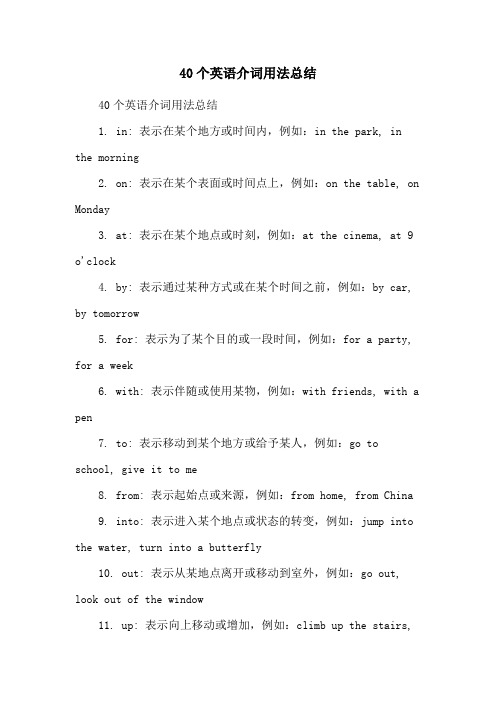
40个英语介词用法总结40个英语介词用法总结1. in: 表示在某个地方或时间内,例如:in the park, in the morning2. on: 表示在某个表面或时间点上,例如:on the table, on Monday3. at: 表示在某个地点或时刻,例如:at the cinema, at 9 o'clock4. by: 表示通过某种方式或在某个时间之前,例如:by car, by tomorrow5. for: 表示为了某个目的或一段时间,例如:for a party, for a week6. with: 表示伴随或使用某物,例如:with friends, with a pen7. to: 表示移动到某个地方或给予某人,例如:go to school, give it to me8. from: 表示起始点或来源,例如:from home, from China9. into: 表示进入某个地点或状态的转变,例如:jump into the water, turn into a butterfly10. out: 表示从某地点离开或移动到室外,例如:go out, look out of the window11. up: 表示向上移动或增加,例如:climb up the stairs,wake up12. down: 表示向下移动或减少,例如:walk down the hill, calm down13. about: 表示关于某事或在某个范围内,例如:talk about the movie, wander about the city14. off: 表示离开或关闭,例如:get off the bus, turnoff the lights15. on: 表示打开或激活,例如:turn on the TV, switch on the computer16. over: 表示越过或在某地上方,例如:jump over the fence, fly over the city17. under: 表示在某物下面或被控制或影响,例如:hide under the bed, live under his rules18. with: 表示具有某种特征或和某人一起做某事,例如:a man with blue eyes, dance with me19. without: 表示没有某物或在缺乏某物的情况下,例如:go without food, live without regret20. by: 表示通过某种方式,例如:learn by doing, go by bus21. through: 表示穿过某物或完成某事,例如:walk through the door, go through the documents22. across: 表示横穿某物或在某个范围内,例如:swimacross the river, all across the world23. between: 表示在两个事物之间或在某个时间段,例如:choose between two options, between 9 and 10 o'clock24. among: 表示在三个或三个以上事物之间或在某群人中,例如:share among friends, discuss among colleagues25. around: 表示在周围或在某个时间点附近,例如:walk around the park, around midnight26. through: 表示通过某事物或在某段时间内,例如:read through the book, work through the night27. against: 表示反对或靠在某物上,例如:fight against injustice, lean against the wall28. for: 表示代表或支持某人或某事,例如:vote for a candidate, fight for freedom29. towards: 表示朝向某个方向或对某人有好感,例如:walk towards the beach, feel towards someone30. within: 表示在某个时间或范围内,例如:arrive within an hour, within the city limits31. beyond: 表示超出某个界限或超过某个程度,例如:beyond expectations, beyond the horizon32. along: 表示沿着某个路线或伴随某人一起,例如:walk along the street, sing along with the song33. above: 表示在某物之上或高于某个程度,例如:flyabove the clouds, above average34. below: 表示在某物之下或低于某个程度,例如:swim below the surface, below freezing35. beside: 表示在某物旁边或和某人一起,例如:sit beside me, beside the lake36. near: 表示在某物附近或接近某个时间,例如:live near the beach, near the end37. past: 表示经过某个地点或在某个时间之后,例如:walk past the store, past midnight38. around: 表示在周围或大约某个数量,例如:look around the room, around 20 people39. after: 表示在某个时间之后或追求某人或某事,例如:after dinner, run after the dog40. before: 表示在某个时间之前或在某个事件之前,例如:before sunrise, before the meeting这些介词是英语中常用的一些基本介词,它们在表达地点、时间、方式等方面起到了重要的作用。
介词的常见用法总结

介词的常见用法总结介词在英语语法中扮演着重要的角色,用于表达名词、动词或其他词类之间的关系。
在本篇文章中,将总结介词的常见用法并提供相关的例句,以帮助读者更好地理解和运用介词。
一、位置及方向1. 在……之上(on):The book is on the table.(书在桌子上。
)2. 在……之下(under):The cat is under the chair.(猫在椅子下面。
)3. 在……之间(between):The sandwich is between the two plates.(三明治在两个盘子之间。
)4. 在……旁边(beside):She is sitting beside her sister.(她坐在她妹妹旁边。
)5. 在……之内(inside):The keys are inside the drawer.(钥匙在抽屉里。
)6. 在……之外(outside):They are playing outside the house.(他们在屋外玩耍。
)7. 在……之间(among):The book is among the other books on the shelf.(这本书在书架上其他书之间。
)二、时间1. 在……之前(before):I have to finish my homework before dinner.(我必须在晚饭前完成作业。
)2. 在……期间(during):She met her friends during the summer vacation.(她在暑假期间见到了她的朋友们。
)3. 在……之后(after):We usually go for a walk after dinner.(我们通常在晚饭后散步。
)4. 在……时刻(at):The movie starts at 8 o'clock.(电影八点开始。
)5. 在……期望完成的时间(by):He needs to submit the report by tomorrow.(他需要在明天之前提交报告。
介词用法总结

介词用法总结介词是连接词与词之间关系的一类虚词,它在句子中起到链接作用,并且具有一定的语法功能。
正确地使用介词可以使句子更加准确、清晰。
在英语中,有许多常用的介词,本文将对其中的一些常见介词及其用法进行总结。
一、介词用于表示地点和位置1. in:表示在某个范围或地点之内Examples:- The book is in the bag.- She lives in New York.2. at:表示在某个具体的地点Examples:- We met at the park.- He works at the office.3. on:表示在某个表面或者位置上Examples:- The cat is sitting on the chair.- The picture is on the wall.二、介词用于表示时间1. on:表示某一天或日期Examples:- I have a meeting on Monday.- We will celebrate New Year's Day on January 1st.2. at:表示具体的时刻Examples:- The train will arrive at 8 o'clock.- Let's meet at noon.3. in:表示较长的时间段Examples:- She will go on vacation in the summer.- We usually have a family dinner in the evening.三、介词用于表示原因和目的1. for:表示目的Examples:- I bought a new dress for the party.- He is studying hard for the exam.2. because of:表示因果关系- The match was canceled because of the rain.- She couldn't come to the party because of her illness.四、介词用于表示方式和手段1. by:表示通过某种方式或手段Examples:- I go to work by bus.- The letter was sent by email.2. with:表示使用某物或与某人一起Examples:- She wrote the letter with a pen.- He went to the park with his friends.五、介词用于表示关系和比较1. of:表示某物的一部分、属于或由...组成Examples:- The first chapter of the book is interesting.- The house is made of bricks.2. to:表示所属关系或比较- The tail belongs to the dog.- He is taller than his brother.六、其他常用介词1. with:表示同伴或陪伴关系Examples:- I went to the movies with my friends.- She enjoys traveling with her family.2. without:表示没有某种情况或物品Examples:- I can't live without music.- He ate lunch without a fork.总结:介词在英语中起到非常重要的作用,它可以连接词与词之间的关系,使句子更加准确和流畅。
高中介词的用法归纳

高中介词的用法归纳一、介词的分类1、时间介词at:用于具体的时刻,如 at six o'clock。
in:用于较长的时间段,如 in the morning,in May,in 2023。
on:用于具体的日期或星期几,如 on Monday,on May 1st。
during:在期间,强调一段时间的过程,如 during the summer vacation。
for:表示持续的时间,如 for two hours。
since:自从以来,常用于现在完成时,如 since 2010。
until / till:直到,如 I will wait until you come2、地点介词at:用于较小的地点,如 at the bus stop。
in:用于较大的地点,如 in Beijing,in the room。
on:在上面,与表面有接触,如 on the table。
above:在上方,不接触表面,如 The plane is flying above the cloudsover:在正上方,垂直上方,如 There is a bridge over the river under:在下面,如 The cat is under the chairbelow:在下方,不一定垂直,如 The temperature is below zero between:在之间(两者),如 between A and B。
among:在之间(三者或三者以上),如 among the students。
3、方式介词by:通过方式,如 by bike,by bus。
with:使用工具,如 with a pen,with my hands。
in:用语言,如 in English,in Chinese。
4、其他常见介词of:的,如 a map of China。
to:朝,向,如 go to school。
from:从,如 from Beijing to Shanghai。
超全的英语介词用法归纳总结
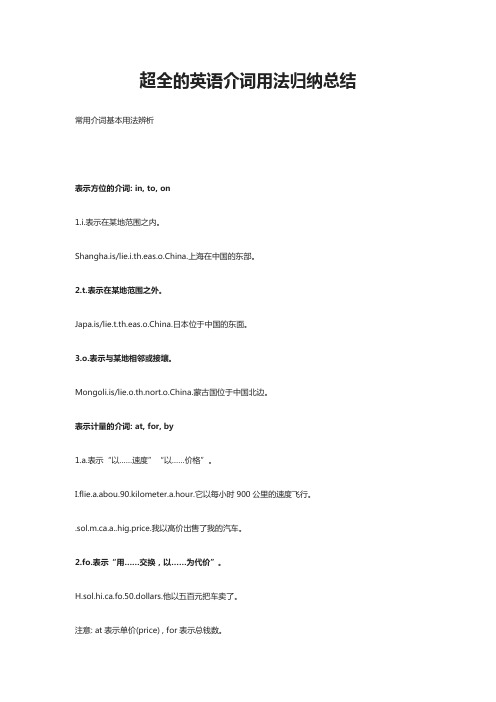
超全的英语介词用法归纳总结常用介词基本用法辨析表示方位的介词: in, to, on1.i.表示在某地范围之内。
Shangha.is/lie.i.th.eas.o.China.上海在中国的东部。
2.t.表示在某地范围之外。
Japa.is/lie.t.th.eas.o.China.日本位于中国的东面。
3.o.表示与某地相邻或接壤。
Mongoli.is/lie.o.th.nort.o.China.蒙古国位于中国北边。
表示计量的介词: at, for, by1.a.表示“以……速度”“以……价格”。
I.flie.a.abou.90.kilometer.a.hour.它以每小时900公里的速度飞行。
.sol.m.ca.a..hig.price.我以高价出售了我的汽车。
2.fo.表示“用……交换,以……为代价”。
H.sol.hi.ca.fo.50.dollars.他以五百元把车卖了。
注意: at表示单价(price) , for表示总钱数。
3.b.表示“以……计”, 后跟度量单位。
The.pai.hi.b.th.month.他们按月给他计酬。
Her.egg.ar.sol.b.weight.在这里鸡蛋是按重量卖的。
表示材料的介词: of, from, in1.o.成品仍可看出原料。
Thi.bo.i.mad.o.paper.这个盒子是纸做的。
2.fro.成品已看不出原料。
Win.i.mad.fro.grapes.葡萄酒是葡萄酿成的。
3.i.表示用某种材料或语言。
Pleas.fil.i.th.for.i.penci.first.请先用铅笔填写这个表格。
The.tal.i.English.他们用英语交谈。
表示工具或手段的介词: by, with, on1.b.用某种方式, 多用于交通。
.wen.ther.b.bus.我坐公共汽车去那儿。
2.with表示“用某种工具”。
H.brok.th.windo.wit..stone.他用石头把玻璃砸坏了。
介词的常见用法总结
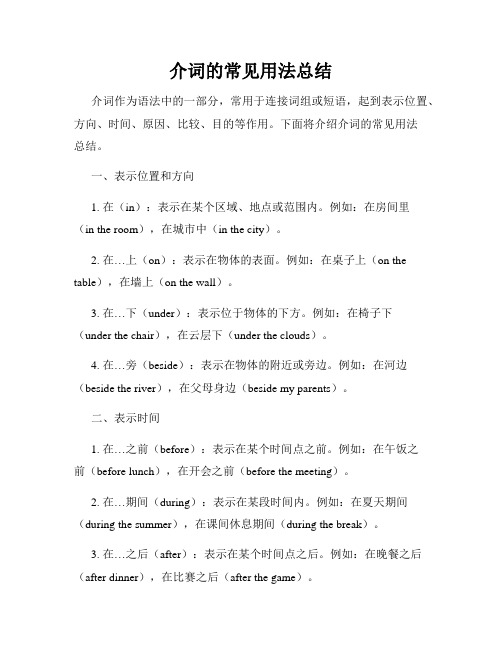
介词的常见用法总结介词作为语法中的一部分,常用于连接词组或短语,起到表示位置、方向、时间、原因、比较、目的等作用。
下面将介绍介词的常见用法总结。
一、表示位置和方向1. 在(in):表示在某个区域、地点或范围内。
例如:在房间里(in the room),在城市中(in the city)。
2. 在…上(on):表示在物体的表面。
例如:在桌子上(on the table),在墙上(on the wall)。
3. 在…下(under):表示位于物体的下方。
例如:在椅子下(under the chair),在云层下(under the clouds)。
4. 在…旁(beside):表示在物体的附近或旁边。
例如:在河边(beside the river),在父母身边(beside my parents)。
二、表示时间1. 在…之前(before):表示在某个时间点之前。
例如:在午饭之前(before lunch),在开会之前(before the meeting)。
2. 在…期间(during):表示在某段时间内。
例如:在夏天期间(during the summer),在课间休息期间(during the break)。
3. 在…之后(after):表示在某个时间点之后。
例如:在晚餐之后(after dinner),在比赛之后(after the game)。
三、表示原因1. 因为(because of):表示由于某个原因。
例如:因为天气原因(because of the weather),因为健康问题(because of health issues)。
2. 由于(due to):表示由于某种情况或原因。
例如:由于交通堵塞(due to traffic congestion),由于工作原因(due to work commitments)。
四、表示比较1. 像…一样(like):表示两个或多个事物在某些方面的相似性。
介词的用法归纳
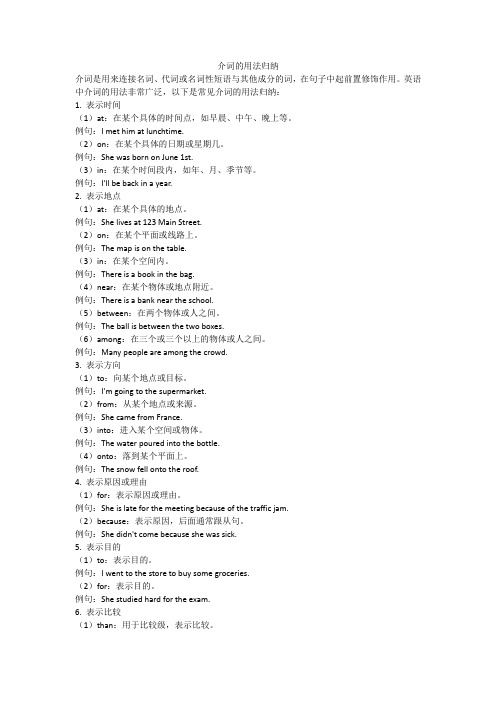
介词的用法归纳介词是用来连接名词、代词或名词性短语与其他成分的词,在句子中起前置修饰作用。
英语中介词的用法非常广泛,以下是常见介词的用法归纳:1. 表示时间(1)at:在某个具体的时间点,如早晨、中午、晚上等。
例句:I met him at lunchtime.(2)on:在某个具体的日期或星期几。
例句:She was born on June 1st.(3)in:在某个时间段内,如年、月、季节等。
例句:I'll be back in a year.2. 表示地点(1)at:在某个具体的地点。
例句:She lives at 123 Main Street.(2)on:在某个平面或线路上。
例句:The map is on the table.(3)in:在某个空间内。
例句:There is a book in the bag.(4)near:在某个物体或地点附近。
例句:There is a bank near the school.(5)between:在两个物体或人之间。
例句:The ball is between the two boxes.(6)among:在三个或三个以上的物体或人之间。
例句:Many people are among the crowd.3. 表示方向(1)to:向某个地点或目标。
例句:I'm going to the supermarket.(2)from:从某个地点或来源。
例句:She came from France.(3)into:进入某个空间或物体。
例句:The water poured into the bottle.(4)onto:落到某个平面上。
例句:The snow fell onto the roof.4. 表示原因或理由(1)for:表示原因或理由。
例句:She is late for the meeting because of the traffic jam.(2)because:表示原因,后面通常跟从句。
史上超全的英语介词用法归纳总结!不看太可惜了
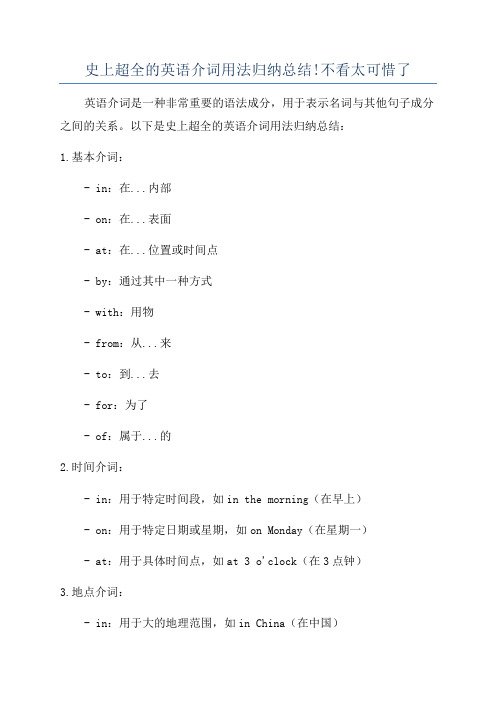
史上超全的英语介词用法归纳总结!不看太可惜了英语介词是一种非常重要的语法成分,用于表示名词与其他句子成分之间的关系。
以下是史上超全的英语介词用法归纳总结:1.基本介词:- in:在...内部- on:在...表面- at:在...位置或时间点- by:通过其中一种方式- with:用物- from:从...来- to:到...去- for:为了- of:属于...的2.时间介词:- in:用于特定时间段,如in the morning(在早上)- on:用于特定日期或星期,如on Monday(在星期一)- at:用于具体时间点,如at 3 o'clock(在3点钟)3.地点介词:- in:用于大的地理范围,如in China(在中国)- on:用于较小的地理范围或表面,如on the street(在街上)- at:用于具体地点,如at the supermarket(在超市)4.方向介词:- to:表示到达一些地方,如go to school(去学校)- into:表示进入一些地方,如go into the house(进入房子)- out of:表示离开一些地方,如get out of the car(离开车)5.原因介词:- because of:由于,如He is late because of the traffic(他因为交通堵塞而迟到)- due to:由于,如The flight was canceled due to bad weather(因为恶劣天气,航班被取消)6.动词短语介词:- look after:照顾,如She looks after her younger brother (她照顾她的弟弟)- take care of:照顾,如He takes care of his plants(他照顾他的植物)7.形容词短语介词:- interested in:对...感兴趣,如She is interested in music (她对音乐感兴趣)- good at:擅长...,如He is good at playing basketball(他擅长打篮球)8.其他常见介词用法:- with regard to:关于,如With regard to the matter, I have something to say(关于这件事,我有些话要说)- instead of:代替,如I will go instead of him(我将代替他去)- according to:根据,如According to the weather forecast, it will rain tomorrow(根据天气预报,明天会下雨)以上是一些常见的英语介词用法总结,希望能帮到你!。
- 1、下载文档前请自行甄别文档内容的完整性,平台不提供额外的编辑、内容补充、找答案等附加服务。
- 2、"仅部分预览"的文档,不可在线预览部分如存在完整性等问题,可反馈申请退款(可完整预览的文档不适用该条件!)。
- 3、如文档侵犯您的权益,请联系客服反馈,我们会尽快为您处理(人工客服工作时间:9:00-18:30)。
介词的用法总结归纳介词的用法总结归纳一、 In介词 prep.1.(表示位置)在…里面; 在, 于; 在…部位上I could feel the tension in the room.我可以感觉到房间里的紧张气氛。
They live in France.他们住在法国。
2.(表示时间)在…时期, 在…之后, 在过程中In her twenties and thirties she had had no difficulty getting jobs.她在二三十岁时找工作一点也不困难。
I cannot see you now, e back in half an hour.我现在不能见你, 半小时后回来。
3.(表示方向)往…内, 朝…方向I saw him go in the shop.我看到他走进了商店。
4.(表示状态)处于…之中, 在…情况下Martin was in his pyjamas.马丁穿着睡衣。
They were living in terrible poverty.他们生活在极度贫困之中。
5.(表示方式)用, 以, 按, 乘, 以…形式They were speaking in Italian.他们在讲意大利语。
They went up in the lift.他们乘电梯上楼了。
6.(表示原因)由于, 为了He went in fear of his life.他为自己的性命担忧, 所以走了。
7.(表示领域, 范围)在…以内It is not in my power to do that.做那事非我力所能及。
8.(表示结果)当做, 作为What did you give him in return?你给他什么作为报答呢?9.(表示目的)为了They set off in search of the lost child.他们出发去寻找走失的孩子。
10.[表示职业、活动等]从事于,参加11.[表示数量、程度、比例]按,以;从…中12.[表示品质、能力等]在…之中;在…身上I don't think he had it in him.我认为他没这个本事。
二、Into介词 prep.1.(表示时间)持续到, 进行到The meeting carried on into the afternoon.会议一直延续到下午。
2.(表示方向)进入…中, 到…里Anney dived into the water.安尼潜入水中。
He came into the room.他到房子里面。
3.(表示状态)进入…状态, 欠…债They burst into laughter.他们突然大笑起来。
He is into me for one hundred yuan.他欠我100元。
4.(表示对象)撞上, 渗进, 非常喜欢He bumped into me.他撞上了我。
The oil will soak into the wood.油会渗进木头里。
She is into music.她喜欢音乐。
5.(表示目标)对着, 朝着She looked into my eyes.她盯着我的眼睛看。
6.(表示结果)分成, 变成He sawed the stick into pieces.他把棍子锯成几截。
Dusk deepened into night.黄昏变成了夜色。
She must be into her thirties by now.她一定30来岁了。
7.(表示所属)输入The information goes into a puter.这信息输入到电脑中。
8.(表示过程)从事于He talked of going into medicine.他谈到要学医。
9.(表示运算) 除Dividing 3 into 6 gives 2.六除以三等于二。
三、On介词 prep.1.(表示位置)在…上, 在…旁, 在…身边That book on the desk is an atlas.桌上的那本书是地图册。
2.(表示时间)在…之时It ourred on the morning of the fifteenth.事情发生在15号的上午。
On arriving home, I was met by my daughter.到家时 * 儿出来迎接我。
3.(表示方向)向, 往, 朝; 沿着, 顺着They marched on the enemy's fortress.他们向敌人的要塞进军。
We were driving on a California freeway.我们正沿着加利福尼亚的一条快车道驾车行驶。
4.(表示状态)系于, 悬于; 附于A picture hangs on the wall.墙上挂着一幅画。
He carried a coat on his arm.他手臂上搭着一件外衣。
5.(表示方式)乘, 坐, 骑She will leave on an early train.她将乘早班火车离开。
We went to the factory on foot.我们步行到工厂去。
6.(表示对象)对, 对于, 碰在, 对…造成困难There is much to be said on both sides.公说公有理, 婆说婆有理。
The car broke down on us.汽车抛锚给我们造成了麻烦。
7.(表示原因)由于, 因为The old worker retired on aount of age.老工人因年老而退休。
8.(表示比较)与…相比Today's weather is an improvement on yesterday's.今天的天气比昨天的好。
9.(表示方位)在…方位The town stands on the left bank of the river.该镇坐落在河的左岸。
The post office is on the right.邮局在右边。
四、To介词 prep.1.(表示时间)到, 直到, 在…到来之前, 离…The Parliament was prorogued to the tenth of February.议会休会到二月十日。
2.(表示方向)朝, 往, 通向He turned to his panion before he replied.他转身朝向他的伙伴然后回答。
3.(表示状态)紧贴着, 紧靠着, 对着The two lovers danced cheek to cheek.那对情侣脸贴着脸跳舞。
4.(表示对象)对, 对于, 对…来说What will Doris say to it?对此事多丽丝将怎么说呢?5.(表示比较)比, 相对于The men are noodles to her.与她相比, 这些男人都是笨蛋。
6.(表示方位)在…方向[方位], 处于…顺序Scotland is to the north of England.苏格兰在英格兰之北。
7.(表示距离)离, 距离It is ten kilometres to the station.到车站十公里。
8.(表示目标)到达, 直到We came to a picturesque cottage.我们来到一座风景如画的村落。
9.(表示结果)转换为, 转变为, 趋于Wait until the lights change to green.等交通灯变成绿色再走。
10.[表示归属]属于;…的the key to the classroom教室的钥匙11.[表示附加]附加于;加于add this to the others把这个加在另外几个上面12.[表示伴随]跟着; 伴随;随同She danced to the music.她合着音乐跳舞。
13.关于;就…而言;对于;依…看What will he say to this?对此他会说什么?14.适合;合乎;对…的反应是五、Of介词 prep.1.(表示时间)在…的, 在…之前; 在…期间He was born at the turn of the century.他出生于世纪之交。
What do you do of a Saturday?星期六你干什么?2.(表示方式)根据She did it of her own will.她是自愿这么做的。
3.(表示对象)对于, 就…而言He felt quite certain of suess.他对成功很有把握。
4.(表示原因)由于, 因为, (用于某些形容词后,后接与感情相关的人或事)I was sick of their fun and games.他们的嬉闹让我厌烦。
5.(表示方位)在; 位于New York is east of Washington.纽约在华盛顿以东。
6.(表示范围)在…之中Tom is the eldest of the family.汤姆是家里年龄最大的。
7.(表示结果)在…方面The place is easy of aess.这地方容易进入。
8.(表示目的)用于…的This is a house of prayer.这是一座教堂。
9.(表示否定)缺乏, 没有They were destitute of necessaries of life.他们缺少生活必需品。
10.属于(某人);关于(某人)11.属于(某物);(某事)部份的;关于(某物)12.出身于(某背景);住在(某地)13.关于,反映(某人或某事)14.(用于表示性质、组成或涵盖)即,由…组成15.(用于表示计量、时间或年龄等)16.(常用在 some、a few 等词语之后,表示人或物的所属)属于…的17.(表示人或事的时空位置)在,当18.(用于由动词转化的名词之后,of 之后的名词可以是受动者,也可以是施动者)19.(用于某些动词后,后接动作所涉及的人或事)20.(用于对某人的行为发表看法)21.(用于一个名词修饰另一个名词时)六、At介词 prep.1.(表示位置) 在, 于; 到达, 达到; 经, 由; 在…旁, 靠近; 在…里; 在…上; 在…方位He was not at his office.他不在办公室。
He was standing at the door.他正站在门边。
2.(表示时间)在, 在…时刻[时辰, 期间, 阶段, 时节]; 在…岁时The meeting will open at 15 ∶ 00.会议在下午三点钟开始。
3.(表示状态)处于…状态, 在…情况下;处于最佳(或最差等)状态;在全盛(或谷底等)时期The soldiers are standing at attention.士兵们立正站着。
